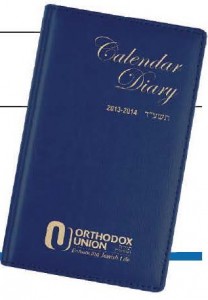OU Calendar Diehards and Proud of It
 In the age of the iPhone, some people prefer to keep track of their appointments the old-fashioned way
In the age of the iPhone, some people prefer to keep track of their appointments the old-fashioned way
With the world wedded to every newfangled handheld device, one would think users of the OU Pocket Diary are rapidly becoming extinct. But just ask these hardcopy holdouts and you’ll get a very different story.
“The first step to recovery is admitting you’re addicted,” says Rabbi Ephraim Buchwald, director of the National Jewish Outreach Program (NJOP) talking about his longtime “love affair” with the OU Diary. “I find it’s a lot easier to open up the Diary and look at the day before me than to maneuver the new technological offerings. I am an iPhone-carrying person, but I feel lonely without my Diary. It goes with me everywhere.”
He’s not the only one smitten with the handy companion.
“It’s my life,” says Rabbi Dr. Mitchell Orlian of Brooklyn, professor of Hebrew and Bible at Yeshiva University who has been a diehard fan of the Diary for over a decade. “My appointments, doctors, meetings, university schedule, the parashah, haftarah—they’re all in my little book. I can’t function without it. One day I accidentally didn’t take it with me; I felt bereft. I didn’t know what to do. I was totally discombobulated.”
Thousands of calendar diaries are mailed out to OU members each year around Rosh Chodesh Elul. The Diary is one of the perks of OU membership.
Published for decades, the Diary includes a complete calendar of the national and Jewish holidays, a listing of that day’s daf yomi, each week’s Torah reading and Shabbat candle lighting times in major cities, the Minchah and Maariv prayers and Birkat Hamazon.
“Many people use it to daven,” says Mayer Fertig, chief communications officer at the OU.
Diary devotees are shameless about their addiction. Joel Mandel of Hewlett, New York, a partner in an electrical supply house, will only buy T-shirts with pockets to “support” his habit. “The holidays are listed for this year and the next—so important for planning trips and vacations,” he said. “I travel all over the world with it. I just grab it every morning and put it in my pocket.”
“I see permanence with this book; it’s much more a part of you,” says Rabbi Orlian. “And I can even use it on Shabbat. Each Thursday night I write in the time for my daf yomi on Shabbat afternoon.”
Fertig reports a flurry of desperate pleas as Elul approaches. “People e-mail us asking, ‘Is it out yet?! Is it out yet?!’ But it’s printed in China,” he says, “and so there’s always going to be a little uncertainty about getting it out on time.”
Illustrating the dependence on the Diary, Fertig says, “I think if we announced that we were discontinuing the OU Diary, there would be demonstrators downstairs at 11 Broadway [the OU national headquarters in New York].”
Aficionados, take heart. It doesn’t look like the Diary will become obsolete any time soon. Fertig reassures, “As long as there’s a demand, we’ll keep producing it.”
Bayla Sheva Brenner is senior writer in the OU Communications and Marketing Department.
